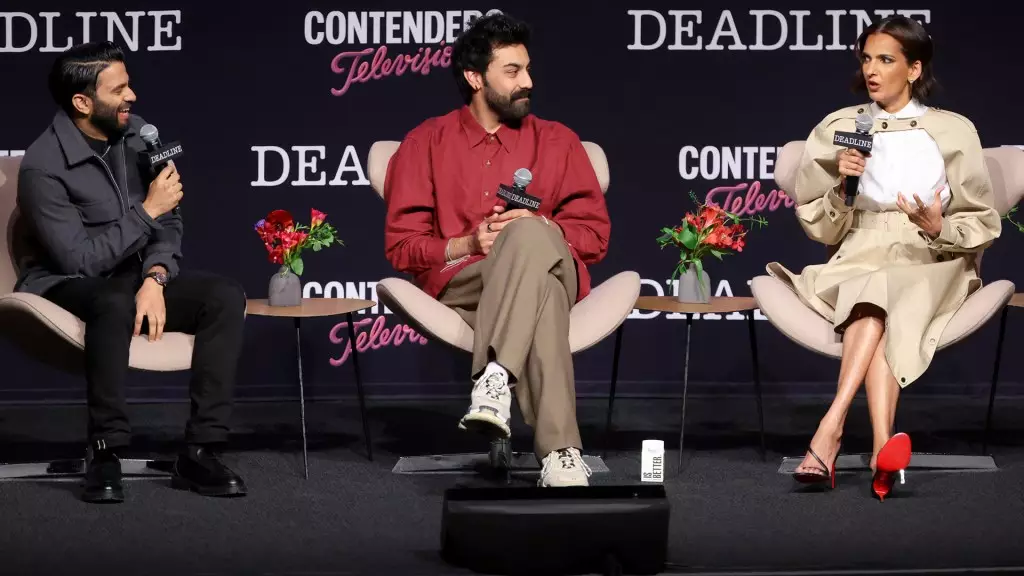In recent years, the television industry has made noticeable strides toward diversifying its narratives, but the journey is still painfully slow. One groundbreaking example is Poorna Jagannathan’s role as Lucky Auntie in the Hulu comedy series *Deli Boys*. This critically acclaimed role shifts traditional power dynamics by placing a South Asian woman in a position typically reserved for men: a crime boss. Jagannathan herself likens her character to a blend of Tony Soprano and the glamorous yet dramatic personas found on *The Real Housewives of Orange County*. It’s a refreshingly audacious choice that challenges stereotypes while breaking the mold of gender expectations in television.
From Male Dominance to Female Empowerment
During a panel discussion at Deadline’s Contenders TV event, Jagannathan revealed that the character of Lucky Auntie was originally conceived as a male. The shift to female representation was inspired by advice from actress Geena Davis, who encouraged series creator Abdullah Saeed to reconsider gender roles in storytelling. Davis’s epiphany illustrates a pivotal moment in the creative process, where the potential of portraying powerful female characters supersedes conventional norms. It’s a testament to what can happen when creators are open to feedback and recognize the value of crafting multi-dimensional characters regardless of gender.
Jagannathan emphasizes the rich depth of her character, highlighting that Lucky Auntie possesses both fierceness and physicality unseen in traditional roles played by women, particularly South Asian actresses. She doesn’t shy away from depicting a strong presence in the form of an action-packed persona, one that includes fierce combat skills. “She is stabbing someone with her left hand and shooting someone else with her right while taking somebody’s eye out with her heel,” Jagannathan describes, marking a bold departure from romanticized depictions of femininity typically seen on screen.
The Duality of Strength and Tenderness
What makes Lucky Auntie stand out, however, is not just her brute force; it’s the unique combination of hardness and softness. Co-star Asif Ali points out this excellent balance that Jagannathan creates. While she encompasses all the bad-assery of a crime boss, she intertwines that persona with the attributes of nurturing, an often-overlooked quality in action-oriented characters. This duality is crucial as it does not merely focus on one-dimensional images of strength, but rather presents a more holistic view of femininity.
In her depiction of Auntie, Jagannathan invokes maternal instincts that are relatable and authentic. She shares candid moments of wiping the food or blood from her nephews’ mouths—a blend of nurturing tenderness and underlying authority. This nuanced portrayal resonates with South Asian familial structures, where the power dynamics between genders are both rigid and fluid. By exploring these elements, *Deli Boys* challenges stereotypes around masculinity and femininity, as well as the roles that South Asian individuals play in media.
Feminism Meets Action in Entertainment
The representation of women in strong, action-oriented roles is gaining momentum in Hollywood, but it still faces pushback from outdated mindsets. With characters like Lucky Auntie, creators are paving the way for feminist narratives that do not sacrifice complexity for the sake of trendiness. Rather than playing into the trope of the ‘strong woman’ as merely a physical force, *Deli Boys* effectively redefines what it means to be both powerful and nurturing.
Moreover, this portrayal serves as a watershed moment not just for South Asian representation but also for women at large. It opens up avenues for discussions on intersecting identities and the multifaceted nature of human experiences, paving the way for more diverse storytelling that embraces everything from crime to comedy.
Through the lens of Poorna Jagannathan’s Lucky Auntie, *Deli Boys* reminds us that powerful narratives can emerge when we dare to challenge traditional casting and storytelling. It’s a move towards a richer, more inclusive pop culture that values the complexities of human experience over safe stereotypes.
